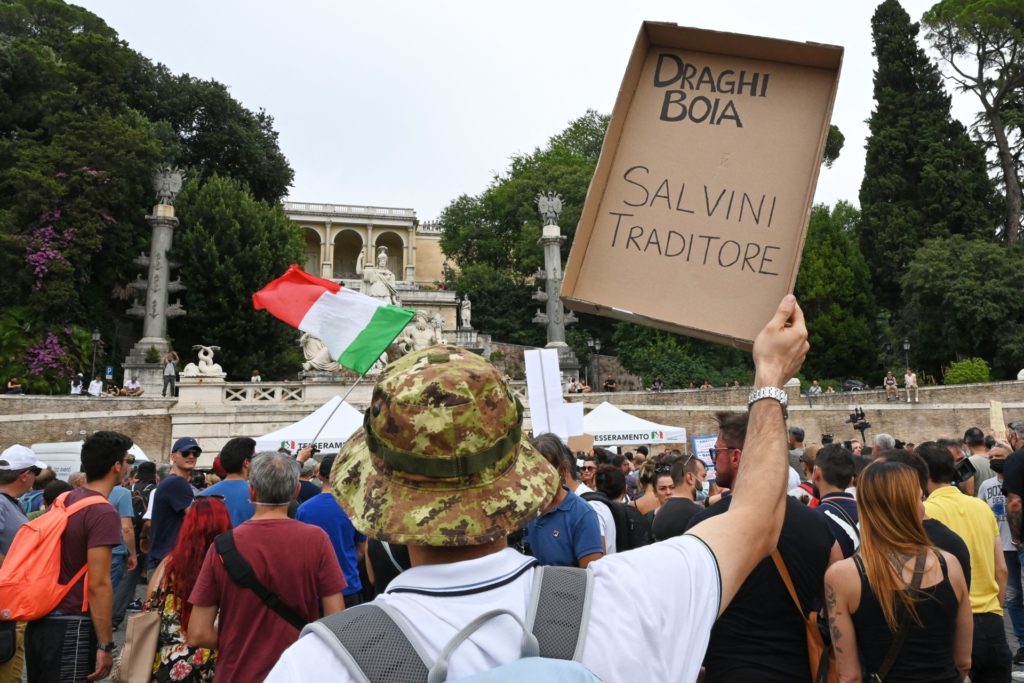ROME — Fabrizio Masucci, president and director of Naples’ Sansevero Chapel Museum, resigned from his post Monday in protest against the requirement of the discriminatory new “Green Pass” in museums.
A recent Italian government decree stipulated the mandatory presentation of a Green Pass — analogous to a vaccine passport — to attend sporting events, visit museums or other places of culture, eat inside restaurants, enter a movie theater, and a number of other activities, beginning on August 6.
The Green Pass, which may be obtained by receiving full vaccination, presenting proof of having recovered from the coronavirus, or showing a negative result for a COVID test carried out within 48 hours, has met with stiff resistance from a large portion of the Italian population.
The resignation of Fabrizio Masucci from the directorship of the Sansevero Chapel Museum, one of the most famous and visited monuments of Naples, has caused something of a sensation because of Masucci’s high visibility. He had been at the helm of the museum for ten and a half years.
To explain his decision, Masucci said that museum regulations are already stringent and imposing the Green Pass is not motivated by epidemiological reasons but seeks to exploit museums for purposes that have nothing to do with their mission.
“In our case, the maximum daily capacity has been reduced by about two thirds and before entering all visitors are subjected to the measurement of body temperature with a contactless thermometer,” Masucci notes in his resignation letter.
Moreover, he continues, “it is mandatory to wear the mask correctly for the duration of the visit and special horizontal and vertical signs have been created to ensure respect for interpersonal distance.”

A protestor holds a placard reading “Draghi hanged, Savini traitor” during a demonstration against the introduction of a mandatory “green pass” in the aim to limit the spread of the Covid-19. (ANDREAS SOLARO/AFP via Getty Images)
“At the ticket office and in the spaces that can be visited, hand sanitizing gel is available to visitors, the visit path is one-way and entry and exit take place through separate gates,” he continues. “The rented audio guides are sanitized after each single use and can be listened to with visitors’ personal earphones or with disposable earphones provided free of charge.”
“The authorities have determined that the adoption of these security measures in museums is compatible with the opening to the public,” Masucci states, adding that research has shown that museums are among the places with “the least risk of contagion.”
“In light of these facts,” Masucci continues, “it is clear that the obligation of a Green Pass for access to museums is not linked to epidemiological assessments specifically linked to the museum context.”
In fact, a recent government press conference revealed that requiring the Green Pass “was deemed exclusively a useful tool, among many others, for the stated purpose of obtaining more numerous recruits in the vaccination campaign,” Masucci notes.
“Without entering into the merits of the aims the government has set for itself, and obviously not having any prejudices whatsoever against vaccines, I nevertheless object to the instrumentalization of museums… for achieving any objective foreign to their natural purpose,” he said, especially when that instrumentalization “jeopardizes rather than favoring social cohesion.”
If a museum is asked to renounce equal treatment of visitors for reasons that can only be perceived as instrumental, he continues, “I would quietly recall that museums are by their vocation places of inclusion and that equal access to art and culture is the right of all.”
“I hope that the competent authorities will be able to reconsider a decision that involves socio-cultural aspects of significant collective interest,” Masucci writes.
“Indeed, there would be favorable conditions for making museums a safe ‘neutral space’ in which people, surrounded by beauty, can begin to know and recognize each other again, without labeling each other,” he states.

Protestors stand in front of riot police officers during a demonstration against the introduction of a mandatory “green pass” in the aim to limit the spread of the Covid-19. (ANDREAS SOLARO/AFP via Getty Images)
Noting that the Sansevero Museum will obviously comply with the recent decree, Masucci asserts that he cannot oversee this measure in good conscience and must therefore step down.
“I cannot escape the strongest call of my conscience, which leads me to leave (after more than ten and a half years) the presidency and direction of the Sansevero Chapel Museum,” he declares.
“I hope that this decision is understood for what it is, a simple gesture of consistency in my judgment and my feelings,” he concludes, before thanking the museum’s board of directors and staff for their unconditional support during his tenure as director.

COMMENTS
Please let us know if you're having issues with commenting.